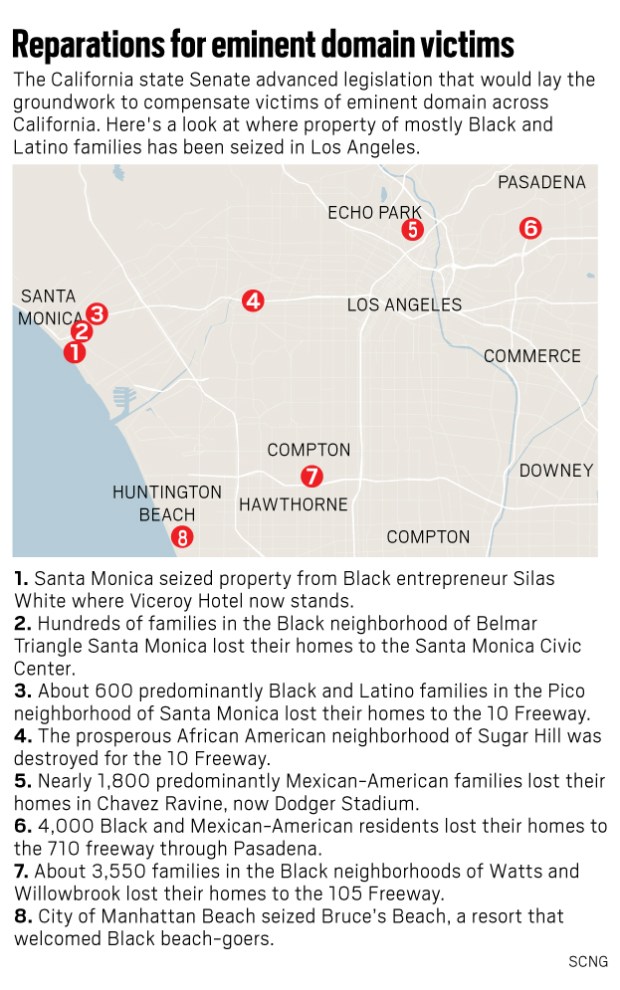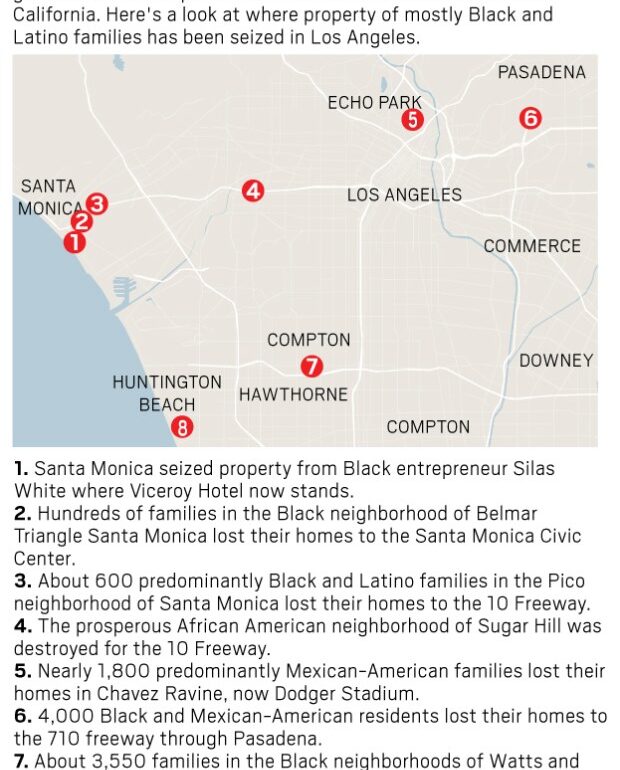This week the California state Legislature advanced a series of bills to confront the harm caused by slavery and that lay the groundwork to compensate families who had their property unjustly seized by the government.
Los Angeles area legislators Senator Steven Bradford and Assemblymember Reggie Jones-Sawyer are at the forefront of this effort. They both served on the California Reparations Task Force, which spent two years studying the state’s historic injustices and provided policy recommendations that became the basis of the newly proposed laws.
This week the state Assembly passed Jones-Sawyer’s AB 3089, which would require the state to issue a formal apology for its role in supporting slavery. The bill now heads to the state Senate for a vote.
“Even though our state entered the union as a free state, every branch of government has a hand in perpetuating the oppression of Black folks,” Jones-Sawyer said before the Assembly. “This bill is an opportunity to confront those tough truths in a meaningful way. It is long past time to acknowledge its role and responsibility for the atrocities that promoted and facilitated the institution of slavery.”
Over in the state Senate, legislators advanced three of Bradford’s bills which would collectively pave the way to provide reparations for descendants of slaves and victims of eminent domain.

SB 1403 would establish the California American Freedmen Affairs Agency to oversee the administration of future reparations and help Californians research their family lineages to determine if they are the descendants of slaves. SB 1331 would set up an account in the state treasury to fund future reparations policies for descendants of slaves and families whose property was unjustly seized by the government.
The third bill, SB 1050, would begin the work of identifying Californians who lost their homes as a result of the racially-motivated use of eminent domain and it will begin the work of providing restitution. All three bills must now make their way through the state Assembly and onto the governor’s desk to become law.
“After two years of study by the California Reparations Task Force on the impact of slavery and institutional discrimination on African Americans in California, we are now taking action,” said Bradford in a statement following the senate’s approval. “These three bills are critically important for setting up the framework for reparations.”
Bradford’s eminent domain bill, SB 1050, would create an agency to review applications of people who claim to be the rightful owners of land taken by the government and determine whether they should be compensated with property or payment.
“The power of eminent domain has been repeatedly used to move Black and brown people off their land, to destroy homes and to devastate the opportunity for families to build generational wealth,” said Bradford in a state Senate Judiciary Committee hearing on the bill.
Providing restitution for victims of eminent domain would have a huge impact in Los Angeles where thousands of Black and Latino families were displaced by the construction of freeways and other infrastructure projects in the 1950s through the 1970s.
Those impacted include about 4,000 Black and Mexican-American residents who lost homes to the 710 Freeway in Pasadena, 3,550 Black families who lost homes to the 105 Freeway in Watts and Willowbrook and 600 Black and Latino families in the Pico neighborhood of Santa Monica who lost homes to the 10 Freeway.
And that is just the tip of the eminent domain iceberg.
Assemblymember Wendy Carrillo is pushing for a law that focuses on reparations for the nearly 1,800 predominantly Mexican-American families who lost their homes in the Chavez Ravine area, where Dodger Stadium now stands. AB 1950 calls for a report documenting the displaced families and recommending restitution measures and cleared the Assembly this week.
“With this legislation, we are addressing the past, giving voice to this injustice, acknowledging the pain of those displaced, offering reparative measures, and ensuring that we honor and remember the legacy of the Chavez Ravine community,” said Carrillo in a statement on the bill.
Notably, legislators did not introduce legislation this year that calls for direct cash payments to the descendants of slavery — even though this was a key recommendation of the task force. A widely cited September 2023 poll, found that while Californians generally support the idea of reparations, the majority are opposed to cash payments.
Additionally, two key reparations bills recommended by the task force and authored by Bradford failed to make it out of the Senate: SB 1007 to provide grants to descendants of enslaved persons to own a home and SB 1013 to provide property tax relief to descendants of slaves.
Concerns also exist around where the legislature will find money to compensate victims of eminent domain down the line, especially as the state confronts a $68 billion deficit this year. Several Republican legislators voted against Bradford’s bills on account of their fiscal concerns.
The Senate Appropriation Committee estimated that it will cost up to $1 million annually to run Sen. Bradford’s California American Freedmen Affairs Agency and hundreds of thousands of dollars to investigate eminent domain claims — let alone disperse payments.
Nevertheless, Bradford is not daunted as he firmly believes in the right Black Californians have the right to demand payment for the generational wealth that was taken through them through the institution of slavery and use of eminent domain.
“If you can inherit generational wealth, you can inherit generational debt,” he said.


